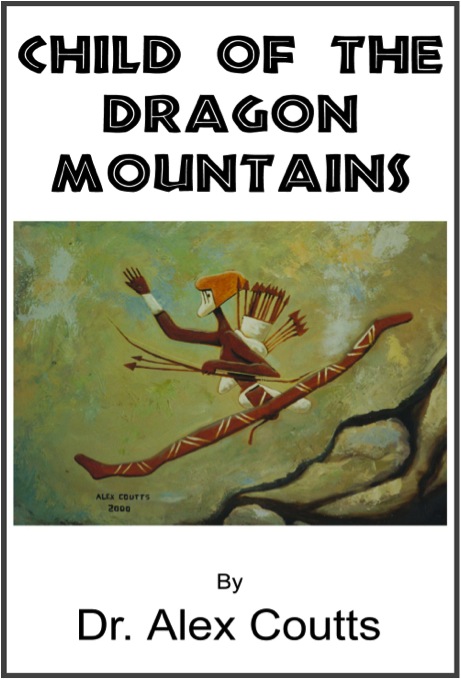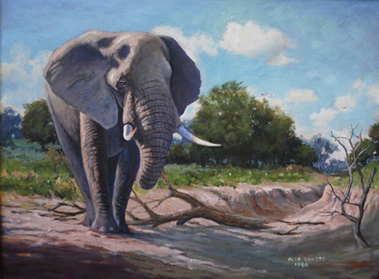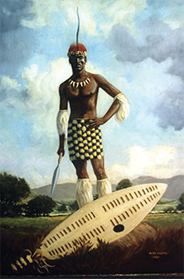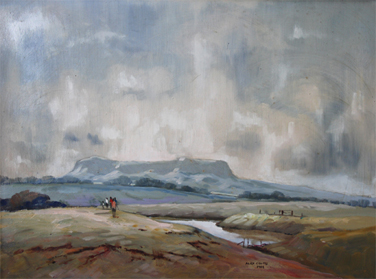| |
ALEX-BOOKS
Currently for sale on Amazon Kindle.
http://www.amazon.com/Alex-Coutts
Child of the
Dragon Mountains
This book is an adult historical adventure novel. It is
for sale on Amazon Kindle.

About the cover painting:
The author painted the cover illustration in oils. It
illustrates a shaman from the main painting in Battle
Cave in the Upper Injasuti area. The original ‘rock art’
painting is one of the most detailed paintings of any
San (‘Bushman’) depicted in the Drakensberg Mountains of
Natal.
About this book:
This book is an adult historical adventure novel. It is
for sale on Amazon Kindle. The book deals with the
twilight years of the Bushmen (San) living in the Natal
Drakensberg mountains. They were a late stone age
people. The book tells the life story of a San born in
1830 in the Ndedema Gorge of the Natal Drakensberg
Mountains. The novel begins with the birth and childhood
of the boy !Bo, and tells how his growing capabilities
are honed, first by his mother and then his father and
other noted artists and shamans of the Ndedema.
!Bo becomes an experienced hunter, artist, shaman, and
rainmaker. Married and with children to raise, he
becomes increasingly aware of the pressures placed on
the San by outside communities engaged in wars,
territorial conquest, and vengeance against cattle
raiders in the San communities. His own family rejects
the rustling of livestock from encroaching farms. He
comes to understand that the clans and communities of
the San are facing genocide.
Much of the book deals with the endeavours of the main
character and his family to preserve and nourish the
cultural heritage that is their lifeblood, while
striving vainly to unite diverse San clans and groups
into a unified political force they hope will engage
constructively with the aggressors.
Loss of life amongst the Ndedema community leads !Bo on
a fruitless quest to Bulihawu (Giants Castle). After the
loss of their children in a misdirected, punitive raid
mounted by stock-farmers, his family embarks on a
lengthy and traumatic venture down the Senqu (Orange
River) to engage with Soai, a noted leader amongst the
cattle raiders; also Chief Moorosi and the
cattle-raiding Amatola. The debilitating aftermath of
the Langalibalele Rebellion also engages and almost
overwhelms his family. Their mission to form a unified
voice of protest fails and they face the genocide
experienced by many others
The book ends in the Amphitheatre in 1885, with the
deaths of arguably the last family of San recorded as
living ‘freely’ in the Drakensberg.
Reading the book is a novel way of gaining insights into
San life and behaviour during a critical time in their
history, within the geographical confines covered by the
book. The period is portrayed as a time of great
political and cultural upheaval. Many San abandoned
their past Stone Age culture as they experienced and
sometimes attempted to imbibe the encroaching Western
frontier culture. Some eventually shifted from using
stone tools to barter for iron implements. Others
entered the cash economy as employed trackers, hunters,
labourers or herders, while a few purchased horses and
guns. Increasingly, San traded with or married members
of iron-working communities
Others resisted desperately and clashed with the
colonial authorities as well as the
agriculturalist-pastoralists who the authorities had
settled as buffers between them and the white farmers.
Many died as a result.
Disclaimer:
Although based on a study of a wide range of excellent
research documents as well as personal experience of the
various geographical areas covered, the book is written
as a novel. It contains imagined dialogue written in
everyday, current English for clarity, and does not
encompass a vain attempt to acquire and translate the
largely forgotten language of the Drakensberg San. The
main characters are portrayed as intelligent people
capable of complex, rational thought, problem-solving
and empathy, and not as the Western, cartoon stereotype
of inherently dim-witted Stone Age people.
Events are based on historical ‘certainty’, probability,
or possibility. The author has designed the book,
therefore, to provoke imaginative thought on the part of
the reader by complementing, supplementing, and
amplifying other authoritative texts and records. The
text of the novel is a general guide to events, and not
the ultimate source of information on any of the topics
covered.
Interested readers should read as much other verified
material as possible to gain a wider understanding from
more academically focused research sources. Some
brilliant books and articles of exceptional quality are
available on the San. South African libraries house most
of them. Wider exploration of sources will enable the
reader to test and evaluate the present book, most
accurately reconstruct and interpret the life of !Bo and
others like him, and more confidently enter a world that
is that of the characters themselves and not that of an
author. Exploring this unique book invites the
unconstrained use of personal imagination. It provides a
challenging yet palatable way of learning about the
Drakensberg San.
|
|



